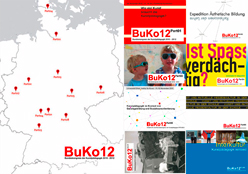Concept: BuKo12 Participation
Posted: 24.02.2012 | No Comments »Since 2003, a biannual Federal Congress of Art Education is held at different places. Following the 2009 Federal Congress of Art Education in Düsseldorf, an initiative group for the organization of the subsequent event was established to discuss the contents and the format of the next federal congress. This process evidenced the shared motivation to develop a participatory and multidimensional congress format with regard to content, structure and staff that takes into account and recognizes the scope of the field of art education.
Participation
Participation is a challenge. It comprises currently crucial societal issues, new forms of communication and of media culture, current demands of education in the sense of an „education in democracy“ and instructions in contemporary art. This resulted in both thematic and structural impulses for the concept of the congress. For participation to take place, congress culture has to be developed further: The cross-linking of multidimensional positions and practices as well as context-specific knowledge requires productive areas of contact between persons and institutions as well as between the theory and practice of art education. To achieve this, different methods supporting collaborative work linking the experiences and perspectives of all participating parties have to be established.
Key Questions
During a two-year phase of discourse (2010-2012), the subject of „participation“ is to be discussed comprehensively considering the main challenges:
- Internationalization and globalization
- Changing media cultures
- Models of cooperation and school development
The specific relationship of art and education, which constitutes the key characteristic of the discipline, challenges the expert community to discuss the question as to how the coupling of art and education contributes to enabling participation. This results in the following key questions shaping the process and provoking the formulation of new questions:
- Tradition – How can art education contribute to participating in cultural heritage and cultural communication?
- Action – How can art education qualify for interaction with a (global) society characterized by heterogeneity and a high degree of mediatization?
- Vision – How can art education prepare for the participation in a future society, a society that doesn’t exist yet?
Parts and Participation: Every Place can become the Center
Several local conferences constitute the decentralized structure of BuKo12. These so-called „Parts“ form a network in which context-specific knowledge, innovative methods as well as institutional affiliations are generated and passed on. The collaboration of interested colleagues from schools, institutions of higher education and various fields of non-formal education is expected in all areas.

Participation and Communication
Due to the heterogeneity of the undertaking as a whole with regard to content and structure, strong cross-linking of the individual Parts is indispensable. Each Part generates different media formats and reports which are made available on the Web in a timely manner and also distributed in print. Thus, wide international expert audiences can be reached as well.
The Initiative Group
Andreas Brenne, Prof. Dr., Universität Osnabrück
Sara Burkhardt, Jun.-Prof. Dr., Technische Universität Dresden
Marc Fritzsche, Justus-Liebig-Universität Gießen
Christine Heil, Prof. Dr., Kunsthochschule Mainz
Gila Kolb, Friedrich-Alexander-Universität Erlangen-Nürnberg
Torsten Meyer, Prof. Dr., Universität zu Köln
Andrea Sabisch, Prof. Dr., Universität Hamburg
Ansgar Schnurr, Dr., Technische Universität Dortmund
Ulrike Stutz, Prof. Dr., Universität Erfurt
Mario Urlaß, Prof., Pädagogische Hochschule Heidelberg
Tanja Wetzel, Prof. Dr., Kunsthochschule Kassel
Jutta Zaremba, Dr., Universität Flensburg
The initiative is supported by the BDK e.V. Fachverband für Kunstpädagogik.


 English
English Deutsch
Deutsch 





Leave a Reply